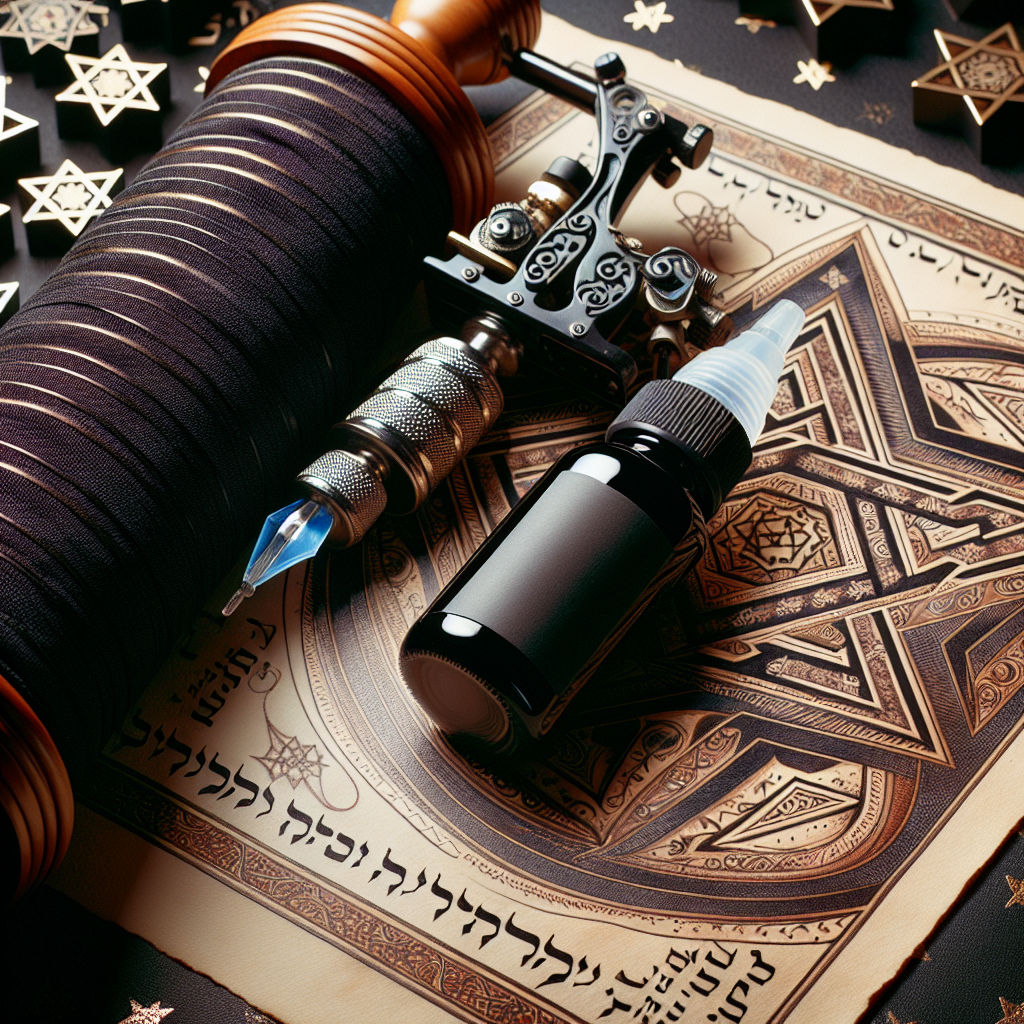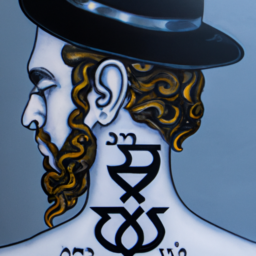“Pre-Tattoo Considerations: Understanding Jewish Traditions”
Introduction to Jewish Traditions and Tattooing
Jewish culture and religion are deeply intertwined, with a rich tapestry of traditions and laws that have been observed for millennia. Within this context, the subject of tattoos holds a particular significance, both historically and in contemporary times. The Jewish perspective on tattoos is rooted in scriptural texts and is further shaped by historical experiences, especially those of the 20th century.
The significance of tattoos within Jewish history is complex. On one hand, body markings have been seen as a deviation from religious norms, while on the other, they have been used as a form of forced identification, most notably during the Holocaust. This duality has contributed to the nuanced views on tattooing within the Jewish community today.
The Torah’s Stance on Body Modification
The primary source for Jewish law, the Torah, addresses the subject of body modification in Leviticus 19:28, which states, “You shall not make any cuts in your body for the dead nor make any tattoo marks on yourselves: I am the Lord.” This verse is often cited as the basis for the Jewish prohibition against tattoos. The interpretation of this commandment has been the subject of rabbinical debate for centuries.
Rabbinical perspectives on the prohibition of tattoos vary, but the consensus among Orthodox authorities is that tattooing is forbidden. This is based on the understanding that the body is a creation of the Divine and should not be altered unnecessarily. The prohibition is also linked to the avoidance of pagan practices, as body modifications were commonly associated with idolatrous rituals in ancient times.
However, there are differing opinions within the more liberal streams of Judaism. Some Reform and Conservative rabbis may interpret the Torah’s injunctions within their historical context, suggesting that the prohibition was specifically against tattoos related to idol worship or mourning practices, rather than a blanket ban on all forms of body art.
Historical Context and the Holocaust
The traumatic association of tattoos with the Holocaust has had a profound impact on Jewish attitudes towards tattooing. During this dark period, concentration camp prisoners were forcibly tattooed with identification numbers, a practice that stripped individuals of their names and identities, reducing them to mere numbers in the eyes of their oppressors. This dehumanizing act has left an indelible mark on the collective Jewish memory, influencing the community’s perceptions of tattoos.
For many Jews, the act of choosing to get a tattoo can be seen as a disregard for the suffering of those who had no choice in the matter. It can also be perceived as a lack of sensitivity towards the historical weight that tattoos carry within the Jewish narrative. Consequently, the Holocaust’s legacy plays a significant role in shaping contemporary Jewish views on tattoos, often reinforcing the traditional prohibitions against them.
The impact of this history is not only emotional but also theological. The forced tattooing of Jews during the Holocaust has raised questions about the nature of choice and coercion in the violation of religious laws. Some rabbinical authorities have addressed the status of Holocaust survivors with tattoos, emphasizing that these markings were obtained under duress and do not reflect a transgression of Jewish law.
In conclusion, the Jewish perspective on tattoos is multifaceted, influenced by scriptural interpretation, rabbinical discourse, and historical context. While traditional prohibitions remain strong, particularly within Orthodox Judaism, there is a spectrum of attitudes across different denominations. The memory of the Holocaust continues to cast a long shadow over the subject, reminding the Jewish community of the profound implications of body markings. As with many aspects of Jewish law and tradition, the conversation around tattoos is ongoing, reflecting the dynamic nature of Jewish thought and the enduring relevance of ancient teachings in the modern world.

Tattoos and Jewish Burial Traditions
The intersection of tattoos and Jewish burial traditions is a subject shrouded in myths and misconceptions. A prevalent belief is that a person with a tattoo may not be buried in a Jewish cemetery. This notion, however, is not grounded in Jewish law but rather in cultural stigma. The origin of this myth is not entirely clear, but it has been perpetuated across generations, causing undue concern for many Jews who have tattoos.
In truth, Jewish burial societies, known as Chevra Kadisha, prioritize the respect and care for the deceased, regardless of whether they have tattoos. The primary concern in Jewish burial is to honor the dead and ensure a dignified burial in accordance with halacha, or Jewish law. The Talmud, which is a central text for Jewish law and philosophy, does not mention tattoos in the context of burial, and there is no halachic basis to exclude someone from a Jewish cemetery for having a tattoo.
However, it is important to note that while tattoos do not disqualify a person from a Jewish burial, they may still affect traditional Jewish mourning practices. For instance, the presence of a tattoo might influence the manner in which the ritual purification, known as tahara, is performed. The Chevra Kadisha may choose to cover the tattoo with a bandage or cloth during the tahara as a sign of respect for the deceased and the mourners who may adhere to a more traditional interpretation of Jewish law.
The Question of Jewish Identity and Expression
The role of tattoos in personal versus collective identity within the Jewish community is a complex and evolving issue. For many Jews, tattoos are a form of self-expression that can reflect personal beliefs, experiences, or memories. This is particularly true among younger generations, who may view tattoos as a way to assert their individuality or to connect with their Jewish identity in a personal and modern way.
However, the collective identity of the Jewish people is deeply rooted in tradition and the shared experiences of history. The Torah’s prohibition against tattoos, as traditionally interpreted, is seen as a marker of Jewish identity, distinguishing Jews from other cultures where body modification might be more commonplace. This collective identity often places value on adherence to Jewish law and customs, which can be at odds with the individualistic nature of tattoos.
The evolving attitudes among different Jewish denominations reflect this tension between personal and collective identity. Reform and Reconstructionist communities, which generally take a more liberal approach to Jewish law, are more likely to accept tattoos as a valid form of personal expression. Conservative communities may be divided, with some individuals holding a more lenient view, while others adhere strictly to traditional prohibitions. Orthodox Judaism typically maintains a firm stance against tattoos, viewing them as a violation of halacha.
Health Considerations in Jewish Law
In Jewish law, the principle of pikuach nefesh, which dictates the preservation of human life above almost all else, plays a significant role in the consideration of health-related decisions. This principle can extend to the decision to get a tattoo, as it raises questions about the potential health risks associated with tattoos, such as infections or allergic reactions.
The halachic imperative to avoid unnecessary harm to one’s body would suggest that any elective procedure that carries a risk to health should be approached with caution. While modern tattooing practices are regulated and generally considered safe, the possibility of complications cannot be entirely dismissed. From a Jewish legal perspective, the health risks associated with getting a tattoo, however minimal, would need to be seriously considered before proceeding.
Moreover, the concept of shmirat haguf, or guarding one’s body, is another aspect of Jewish law that emphasizes the importance of maintaining one’s health. This concept is not only about avoiding harm but also about actively taking care of one’s physical well-being. In this context, the decision to get a tattoo would require a thoughtful assessment of how it might impact one’s health, both immediately and in the long term.
In conclusion, the topics of Jewish burial traditions, identity and expression, and health considerations in Jewish law offer a nuanced view of the relationship between tattoos and Jewish life. While tattoos do not prevent a person from receiving a Jewish burial, they can influence traditional mourning practices. The question of identity and expression through tattoos is a reflection of the dynamic nature of Jewish communities and their varied approaches to tradition and modernity. Lastly, health considerations play a critical role in the decision-making process for tattoos, as they intersect with the Jewish commitment to preserving life and well-being. As the conversation around tattoos within the Jewish community continues to evolve, it is essential to approach these issues with respect, knowledge, and an understanding of the diverse perspectives that make up the tapestry of Jewish life.

The Importance of Intention in Jewish Ethics
In the rich tapestry of Jewish ethics, the concept of kavanah, which translates to “intention” or “direction of the heart,” holds a significant place. This principle is deeply woven into the fabric of Jewish life, influencing how actions are perceived and valued within the community. When it comes to the practice of tattooing, the lens of kavanah offers a nuanced perspective that goes beyond the mere act, probing the motivations and spiritual implications behind it.
The Jewish tradition places a strong emphasis on the intentions that accompany one’s actions. In many religious practices, such as prayer or the performance of mitzvot (commandments), the presence of proper intention is essential for the act to achieve its desired spiritual effect. This focus on the inner life and moral purpose aligns with the broader Jewish view that the sanctity of actions is often determined by the context and consciousness in which they are performed.
Applying this ethical framework to the decision to get a tattoo, one must consider the myriad reasons that might drive an individual to modify their body in such a permanent way. For some, tattoos may serve as a profound spiritual expression, perhaps commemorating a significant life event, honoring a loved one, or even symbolizing an aspect of their Jewish identity. In these cases, the intention is deeply personal and may be imbued with a sense of holiness or remembrance.
Conversely, tattoos acquired for purely aesthetic reasons or as a result of societal trends might be viewed through a different ethical lens. In such instances, the lack of a meaningful intention could be seen as diminishing the act’s value within the Jewish ethical paradigm. Moreover, if the motivation behind a tattoo is to assimilate or conform to a non-Jewish norm, it could be perceived as conflicting with the Jewish imperative to maintain a distinct cultural and religious identity.
The implications of getting a tattoo for spiritual versus aesthetic reasons are not merely theoretical. They can have tangible effects on how an individual is perceived within their community and how they relate to their own sense of Jewishness. A tattoo with spiritual significance might be more readily understood or even respected by others who share a similar value system, whereas tattoos without such grounding might be met with skepticism or disapproval.
Seeking Guidance from Community and Clergy
For those contemplating a tattoo within the Jewish community, seeking guidance from knowledgeable community members and religious leaders can be an invaluable step. These conversations can provide clarity, offer historical and religious context, and help individuals navigate the complex interplay between personal autonomy and communal norms.
Engaging with community leaders and clergy is not about seeking permission per se, but rather about understanding the broader implications of one’s choices. Rabbis and other religious figures can elucidate the traditional Jewish perspectives on body modification, sharing insights from centuries of rabbinical thought and interpretation. They can also provide pastoral support, helping individuals to reflect on their motivations and the potential impact of their decisions on their spiritual lives and community standing.
Approaching such conversations requires respect and openness from both sides. Those seeking guidance must be prepared to listen and consider the viewpoints presented to them, even if they diverge from their initial inclinations. Likewise, community leaders and clergy should strive to engage with inquirers empathetically, recognizing the personal nature of the decision and the diverse ways in which modern Jews express their identity and spirituality.
The value of these dialogues cannot be overstated. They serve not only as a means of education but also as a way to strengthen the bonds within the Jewish community. By fostering understanding and mutual respect, these conversations can help ensure that individual choices are made with a full appreciation of their significance within the Jewish ethical and communal framework.
Alternatives to Permanent Tattoos
For those who are drawn to the idea of body art but are concerned about the permanence of tattoos or their acceptability within Jewish tradition, exploring temporary or less permanent forms of body art can be a satisfying alternative. These options allow individuals to express themselves creatively while remaining aligned with the values of their faith and community.
Temporary tattoos, henna art, and body painting are examples of such alternatives. They offer a way to adorn the body with meaningful symbols or designs without the lifelong commitment that traditional tattoos entail. Moreover, because these forms of body art are not permanent, they do not carry the same weight of prohibition in Jewish law, making them more widely acceptable within the community.
The acceptability and potential benefits of these alternatives are significant. They provide a means for personal expression and can serve as a form of spiritual exploration or commemoration without contravening Jewish teachings on body modification. Additionally, these temporary methods can be used as a way to test out designs and placements before making the more significant decision to get a permanent tattoo.
In conclusion, the Jewish approach to tattoos is multifaceted, with intentionality, community guidance, and alternative forms of expression playing crucial roles. By considering the ethical implications of kavanah, seeking wisdom from community and clergy, and exploring less permanent body art options, individuals can navigate the complex terrain of personal choice while honoring the depth and diversity of Jewish tradition.

Making an Informed Decision: Reflecting on Tattoos in Jewish Life
In the tapestry of Jewish tradition, the threads of history, law, and personal identity intertwine to form a complex picture of religious observance and cultural expression. Among the many topics that spark debate within the Jewish community, the subject of tattoos stands out as particularly contentious. This article aims to encapsulate a thorough analysis of the considerations one must weigh when contemplating tattoos in the context of Jewish life, urging a thoughtful reflection that respects both personal choice and tradition.
The decision to get a tattoo is not one to be taken lightly, especially within the Jewish community, where the echoes of scriptural prohibitions and historical trauma still resonate. The Torah, in Leviticus 19:28, explicitly forbids the practice of body modification, stating, “You shall not make gashes in your flesh for the dead, or incise any marks on yourselves.” This verse has been the bedrock of rabbinical opposition to tattoos for centuries, and its interpretation remains largely unchanged in Orthodox circles. However, as with many aspects of Jewish law, the application and acceptance of this prohibition can vary among different denominations and individuals.
The historical context of tattoos, particularly the indelible mark left by the Holocaust, where tattoos were used as a means of dehumanization and identification in concentration camps, adds a layer of trauma to the discussion. This painful association can influence contemporary Jewish views on tattoos, making the decision to acquire one not just a personal choice but a historical statement as well.
When considering tattoos, one must also take into account Jewish burial traditions. Contrary to popular myth, having a tattoo does not bar a person from being buried in a Jewish cemetery. However, it may affect traditional Jewish mourning practices, as tattoos can be seen as a deviation from the normative Jewish approach to body preservation and respect for the deceased.
The question of Jewish identity and expression is central to the conversation about tattoos. For some, a tattoo may serve as a form of personal identity, a way to express one’s beliefs, experiences, or heritage. For others, it may be seen as a departure from collective Jewish identity, which traditionally values adherence to halacha (Jewish law) and communal norms. As attitudes evolve, so too does the acceptance of tattoos among different Jewish denominations, with more liberal streams offering a more lenient stance on body art.
Health considerations are another critical aspect of Jewish law that must be factored into the decision to get a tattoo. The principle of pikuach nefesh, preserving health and life, is paramount in Judaism. Therefore, the potential health risks associated with tattooing, such as infections or allergic reactions, should be seriously considered in light of this principle.
The importance of intention, or kavanah, in Jewish ethics cannot be overstated. The motivations behind getting a tattoo—whether for spiritual reasons or aesthetic preferences—can significantly influence the ethical considerations of the act. A tattoo with a spiritual or commemorative purpose may be viewed differently than one acquired for purely decorative reasons.
Before making a decision, it is advisable to seek guidance from knowledgeable community members and religious leaders. Engaging in conversations with respect and openness can provide valuable insights and help individuals navigate the complexities of Jewish law and tradition.
For those seeking to express themselves through body art while still honoring their faith, alternatives to permanent tattoos, such as temporary tattoos or henna, may offer a suitable compromise. These less permanent forms of body art can provide a means of expression that is more widely accepted within Jewish tradition.
In conclusion, the decision to get a tattoo within the Jewish community is multifaceted, requiring careful consideration of religious, historical, and personal factors. By summarizing the key points for consideration and encouraging a respectful dialogue, individuals can make informed choices that honor both their personal desires and the rich heritage of Jewish tradition.
